| Srl | Item |
| 1 |
ID:
091228
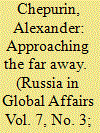

|
|
|
| 2 |
ID:
111950
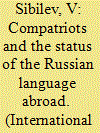

|
|
|
|
|
| Publication |
2012.
|
| Summary/Abstract |
ON OCTOBER 17-18, 2011, a World Thematic Conference of Compatriots called "On the Status of Russian Language in Foreign Countries" was held in Moscow under the aegis of the Government Commission on Compatriots Living Abroad (GCCLA). The conference, particularly such an extensive one, with 200 delegates from 91 countries and 80 guests from Russia in attendance, did not arise from scratch.
It was preceded by an interested and at times even fervent discussion of this topical issue at regional conferences of compatriots (I, for example, had occasion to participate in debates on this topic and understood from the discussion at the regional conference of compatriot associations of the Southern Caucasus in Krasnodar on September 22-23 of this year that the "great and powerful" [Russian language] enjoyed a far from favorable status in the CIS expanse), as well as at special round tables on the status of the Russian language held on the eve of the conference in Ukraine (Kiev), Kazakhstan (Almaty), and the Baltic states (Riga).1
|
|
|
|
|
|
|
|
|
|
|
|
|
|
|
|
| 3 |
ID:
120728
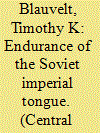

|
|
|
|
|
| Publication |
2013.
|
| Summary/Abstract |
This article will examine the role of the Russian language on the periphery of the post-Soviet space by using multiple sources of data, including original matched-guise experiments, to examine the language situation in contemporary Georgia. This is one of the former Soviet republics in which the use of the titular language was most intensively institutionalized and that most ardently resisted Russification, and one that today for various reasons is most eager to escape the legacy of its Soviet past and to embed itself in the global community. In Georgia the cultural and political influence of the former imperial centre has been greatly reduced, and Russian has been challenged in functional roles by the new international lingua franca of English. The direction that the Russian language takes in a place like Georgia may be a useful bellwether for such transformations elsewhere in the post-Soviet periphery.
|
|
|
|
|
|
|
|
|
|
|
|
|
|
|
|
| 4 |
ID:
140592
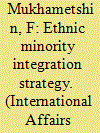

|
|
|
|
|
| Summary/Abstract |
MATTERS RELATED TO LANGUAGE use go beyond the framework of philological disciplines and in some way or other impact various aspects of public life. Language and culture are recognized within the international community as principal "soft power" tools for promoting a country's positive image abroad. In addition to various aspects of language policy in Russia, the joint meeting of the Council on Interethnic Relations and the Council on the Russian Language, chaired by Russian President V.V. Putin, on May 19, 2015, stressed repeatedly the special role of the Russian language in expanding Russia's spiritual and intellectual influence abroad and in the preservation and development of the Russian World. In this context, it is equally important to counter the attempts of certain politicians who build their careers in their home countries on Russophobia, casting the Russian World as a "foreign policy project" of today's Russia, not as an objectively developed form of civilization that should be preserved.
|
|
|
|
|
|
|
|
|
|
|
|
|
|
|
|
| 5 |
ID:
123201
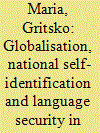

|
|
|
| 6 |
ID:
151324
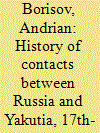

|
|
|
| 7 |
ID:
189194
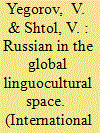

|
|
|
|
|
| Summary/Abstract |
At the same time, according to the degree of its presence in the global linguistic space, Russian comes fourth after French, English, and Indonesian. There are 3.5 persons speaking French for each native speaker of the French language; the correlation is 3.3 for the English language and 2.9 for Indonesian. In this respect, Russian comes close to German: There are 1.7 German speakers per native speaker of German and 1.67 Russian speakers per native speaker of Russian.
|
|
|
|
|
|
|
|
|
|
|
|
|
|
|
|
| 8 |
ID:
158181
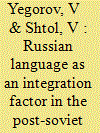

|
|
|
|
|
| Summary/Abstract |
TODAY'S SOCIETY undergoes processes that, besides exceptional dynamism, are marked by a new kind of complexity as a result of interaction between social systems, subsystems and actors. Economics increasingly manifest themselves through politics - something that the founders of Marxism pointed out a long time ago, - and there are more and more spheres where the humanities overlap with politics. Issues that are rooted in the past have become a routine technology for political rivalry. So has the languages issue as a means of domination in a specific sociocultural space and as a mechanism for the pursuit of specific political interests.
|
|
|
|
|
|
|
|
|
|
|
|
|
|
|
|
| 9 |
ID:
120576
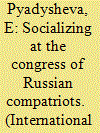

|
|
|
|
|
| Publication |
2013.
|
| Summary/Abstract |
THIS IS NOT THE FIRST TIME that a congress of our compatriots has been held in St. Petersburg at the Tauride Palace. A large number of people, around one thousand, flocking together, enthusiastically discussed problems and heartily greeted acquaintances. From the outside, this function held in a historical building was somewhat reminiscent of a congress of teachers or doctors in Soviet times. But one nuance brought it back to the current day: the people were dressed as priests and Cossacks. And it was this, albeit external feature, that showed how different the people gathered together were, even they were all called Russian compatriots living abroad.
|
|
|
|
|
|
|
|
|
|
|
|
|
|
|
|
| 10 |
ID:
189208
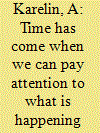

|
|
|
|
|
| Summary/Abstract |
Armen Oganesyan, Editor-in-Chief of International Affairs: Alexander Alexandrovich [Karelin], you are an experienced politician, a founding member of the United Russia party, and have extensive legislative experience. What do you believe needs to be done first of all in our new reality?
|
|
|
|
|
|
|
|
|
|
|
|
|
|
|
|